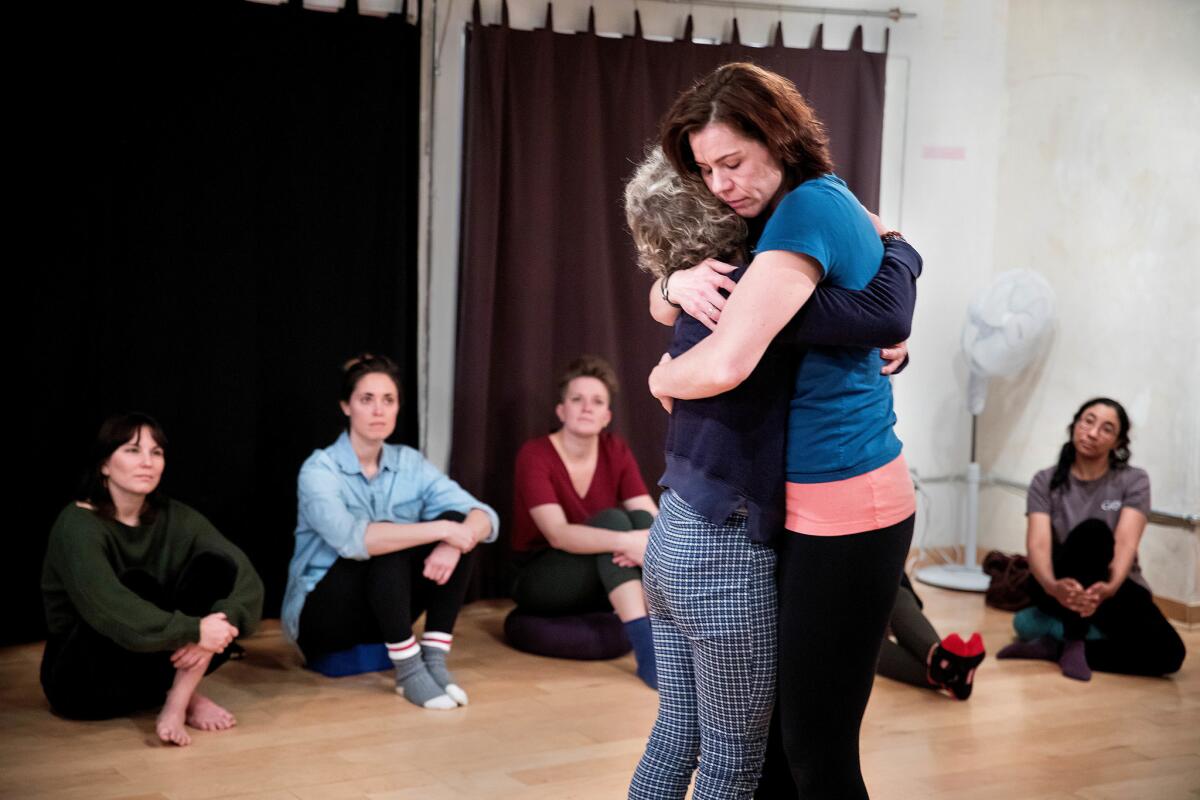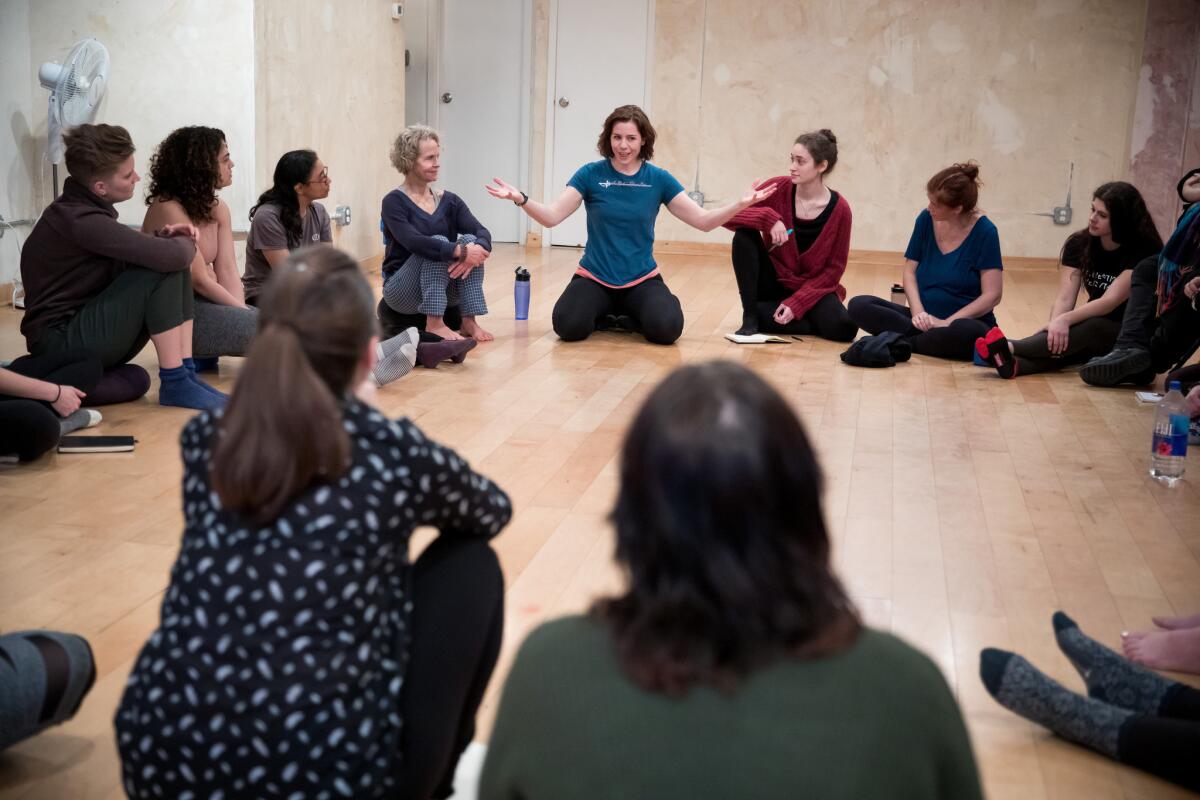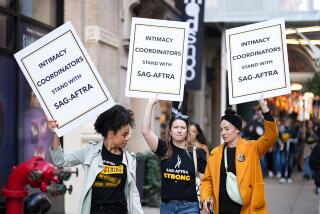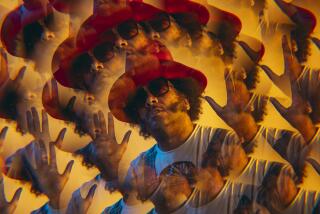How do you make a sex scene sexy? (And keep the actors safe?) Five intimacy coordinators explain their craft

For actors, filming sex scenes can be a job requirement — and an uncomfortable one. When Sarah Scott was shooting an intimate scene for a television pilot, her costar placed her hand on his groin, she said, and later called her into his dressing room and masturbated in front of her. Samara Weaving is reportedly leaving Showtime’s “SMILF” in part because of concerns about how the showrunner handled a closed-set request during the filming of a sexual interlude.
Both the costar and the showrunner have denied these allegations, which helps demonstrate how complicated it can be to orchestrate the performance of sex on set. But a new role has emerged to help directors, showrunners and performers navigate such scenes: the intimacy coordinator.
HBO announced in October that it would hire intimacy coordinators for all of its productions and, since then, interest in the fledgling profession has spiked. To find out how, exactly, these individuals effect change on set, The Times recently spoke with five of them about their newly in-demand trade. These intimacy coordinators (who work on film and television sets) and choreographers (who work with stage performers) are all founders and members of Intimacy Directors International, an organization established in 2016.
Tonia Sina is the creator of the “Intimacy for the Stage” method, the pioneering piece of pedagogy on which the role is largely based. Alicia Rodis is HBO’s resident intimacy coordinator, working on shows such as “The Deuce,” “Crashing” and the upcoming “Watchmen.” Claire Warden is a Broadway mainstay who just choreographed New York Theatre Workshop’s “Slave Play.” Adam Noble is a University of Houston professor who created “Extreme Stage Physicality,” a method equipping student actors to practice consent. And Jessica Steinrock leads consent workshops for improv comedy troupes, including Comedy Sportz Chicago.
The Times conducted separate phone interviews with each person, and has condensed and edited the conversations.
So what is your job, exactly?
Noble: If you’re making a show with fights, there’s no question: You call a fight director. But when it comes to material that’s sexually charged, there are too many times when we’re just leaving actors to their own devices.
Rodis: There’s this black hole where sex scenes have lived for so long. Sometimes directors really get in there, but otherwise it’s, “Figure it out yourself, go for it.” So as an intimacy coordinator, I coordinate. I facilitate the uncomfortable conversations around all the potential land mines, all of the things that could get miscommunicated or misconstrued, or just not talked about.
How did you come to specialize in this?
Sina: While studying stage combat, I was asked to rehearse an intimate scene outside of rehearsal, and it became inappropriate immediately. I thought, “I’m not going to do this to my actors, I’m a choreographer, I have the ability to change this.” I focused my master’s thesis on creating a technique to choreograph sex without victimizing anybody, while at the same time improving the quality of what we were seeing onstage. That was published in 2006.
Rodis: As a fight director and stunt coordinator, I was constantly being brought in to direct sexual-assault scenes because I’m a woman. I couldn’t believe there was no specialty for handling these roles.
Warden: There were a number of actors I taught who were dealing with some kind of trauma, but there were no techniques on how to safely navigate that when they tell these deeply powerful and personal stories. I spent time working with psychologists and therapists so I can help them to do that. Almost two years ago, a friend sent me an article about Tonia [Sina], and then I met with her and Alicia [Rodis], who trained me.
Steinrock: I’ve done improv comedy for nine years, and I’ve had a lot of messy experiences; my friends and I would cry on each other’s shoulders over things that were said to us or done to us in scenes. I’m getting my PhD now, and I came to Tonia with my research about consent in improv. That was three years ago.
Noble: One day a student said to me, “I’d like a new scene partner. I think he tried to rape me.” They hadn’t been able to find a place to rehearse on campus, so they went back to his dorm to rehearse “A Streetcar Named Desire,” and that final scene is basically a rape scene. She allowed me to mediate a conversation, and in that particular case, it was a misunderstanding. He was trying to do the scene, she had gotten triggered and she just ran. But that event was a wake-up call. So I created a methodology to protect students who want to do this work.
What are the steps of your work?
Noble: It begins with some questions. Yes, it can be something as simple as a kiss or a touch, but what story is that event supposed to tell? Is it true to the characters? How is the audience supposed to feel?
Sina: I meet with the director to get an idea of their vision for the scene. Sometimes, directors hire us because they don’t want anything to do with it, which is totally fine, for whatever reason. Not everybody wants to do this work, and not everybody is past their own trauma to be able to choreograph sex in someone else.
Rodis: I read the scripts and notate where there are potential moments of intimacy. A stunt coordinator makes sure [actors] don’t actually punch someone in the face. They cheat it with an angle or padding. It’s the exact same thing with intimacy coordination. “She is topless and performing oral sex on the male character.” OK, cool. Then I work with the actors so that they don’t actually have to do that.
Sina: Then I talk with the actors about what they’re comfortable with doing. I tell them, “I’m not here to make you do what you don’t want to do. I’m here to make sure that you are consenting every step of the way. I’m here to respect your boundaries, and to make sure everybody else respects your boundaries.”
Steinrock: Improvisers don’t choreograph the same way we can in scripted theater, but there are boundary-setting conversations that can happen before we go onstage and ways to ask for consent within the scene.
Noble: If the director says, “I want him to grab her by the boobs because I want the moment to be shocking,” I can say, “OK, she’s not comfortable being grabbed by the breasts, but we can show this character going too far another way. She’s totally willing for him to grab her butt. So let’s just tell the story that you’re looking for in a different way where everybody wins.”
Sina: Then, I adjust. I add breath, I add angles, I add the sleight of hand that makes it look magical. We continue and we make it repeatable.
Noble: If the actor’s doing a move in a show every night and they’re not comfortable with it anymore, they can always remove consent. We can make accommodations, but they have to be free to communicate that.
Rodis: There’s a good amount of pre-production work. I liaison with costumes to make sure that we have robes and intimate barriers ready. Cinematographers and lighting designers are involved too. There are times when I’ll ask to reposition, either to make it more believable or because that actor did not sign off on showing that body part.
Warden: Closure is the most important part. It tells actors that they’re not performing sex for real, that this is the character’s sex life. That’s such a crucial differentiation to make because in the past actors have been asked to just try it, do it, kiss, and then they’re just choreographing themselves with no guidance. They’re kissing each other the way they would kiss somebody and not the way the character would.
What are some nonnegotiable rules of making intimate scenes?
Rodis: At least 24 hours’ notice of nudity. It’s the same if you’re a stunt performer on a TV show: A stunt coordinator calls you the night before, making sure you know exactly what’s happening, like, “It was going to be a 15-foot fall, but it’s looking like 17 now.”
Sina: Ask for consent in rehearsal. If the director says, “Grab her boob,” the actor can turn to the actress and say, “Is it OK?” That one extra step takes two seconds! And she has the ability to say yes or no, or something in between: “I don’t want you to touch me there, but you can touch me in these places.” It’s helping actors have a language so that’s it not, “I’m just gonna say yes to everything because I’m an actor and I can’t say no.”
Steinrock: You can telegraph your movements by going for the hug 80% and leaving that extra 20% for the other person to come in. There’s a huge stigma for saying “no” in improv, which is based purely on this idea of “yes, and.” But truly, “yes, and” is about the acceptance and agreement of ideas; a “no” can be using your suggestion in a different direction. When we treat “yes” and “no” as changes in direction, we can still get fast, energized comedy without violating anyone’s boundaries.
Warden: Stick to the choreography. Once a show is open, the stage manager has the notation of what the physicality is in their book, so if anything strays from the choreography, they address it that day. “I saw tonight that this hand was here, that’s not where it’s supposed to be” or “this lasted longer than it’s supposed to.”
Noble: Use proper nomenclature instead of calling it somebody’s “junk” or grab her “tits” and all of these sketchy, derogatory words. These are body parts, they have names.
Sina: I was choreographing a doctor’s exam with a man, and someone kept saying to the actor, “You ready for anal rape scene?” [The actor] came to me and said, “This makes me uncomfortable that he calls it that.” Yeah, of course it does!
Your job is partly keeping people safe, but also keeping scenes sexy. What’s your intimacy pet peeve?
Rodis: When it doesn’t look like they’re actually doing the act. Most people haven’t been in a sword fight before, so they might not know when they’re watching “Pirates of the Caribbean” that that’s not necessarily how it’d go. But most people have had sexual experiences before, and it’s a lot easier to call bull… on that.
Sina: What really drives me crazy is when there’s no actual intimacy in the scene. That’s an acting technique that we don’t teach actors. They have classes in stage combat, dance, all these other things, but they don’t have classes on how to look somebody in the eye for a while.
Warden: I long for a wider variety of storytelling. It’s very much the same thing again and again: objectification of the female body, a lot of noise and enjoyment from the female body, a lot of broody silence from the male body, and rather dull power dynamics and conventional sex. If we see more sexual gratification for women, more vulnerability in men, more “Ow! That was my elbow, that was my thigh,” we can go, “They have sex just like I do! I don’t have to aspire to this very narrow perfection we keep seeing.”
Steinrock: In improv, it’s hand position. It’s very small, but when people only lightly put their arms around each other, or their fingers are full of tension as if they’re ready to spring away from their partner at any moment, that tells a story of you don’t actually want to be touching this person. The audience can feel that.

How has your work changed since the #MeToo era began?
Warden: It’s changed enormously. The knowledge that all of this has happened in our industry is present in the room. I say, “I’ll take care of that fear and trauma while you get on with your work, and we’ll do this together.” Almost every actor I’ve worked with is grateful to have someone in charge of that.
Some directors are resistant at first, normally because of a misunderstanding or a lack of understanding of why I’m there. We’ll start the work and every time, they’re like, “That was really good! Can you also look at this scene? And I also have this next project … .”
And then those who are just worried that we’re taking away their privilege of abuse and power. They’re not very happy, but tough …, really. This change for you is going to be painful. I’m here to help educate you and support you through that, but you don’t get to do that anymore.
Twitter: @cashleelee
More to Read
The biggest entertainment stories
Get our big stories about Hollywood, film, television, music, arts, culture and more right in your inbox as soon as they publish.
You may occasionally receive promotional content from the Los Angeles Times.











